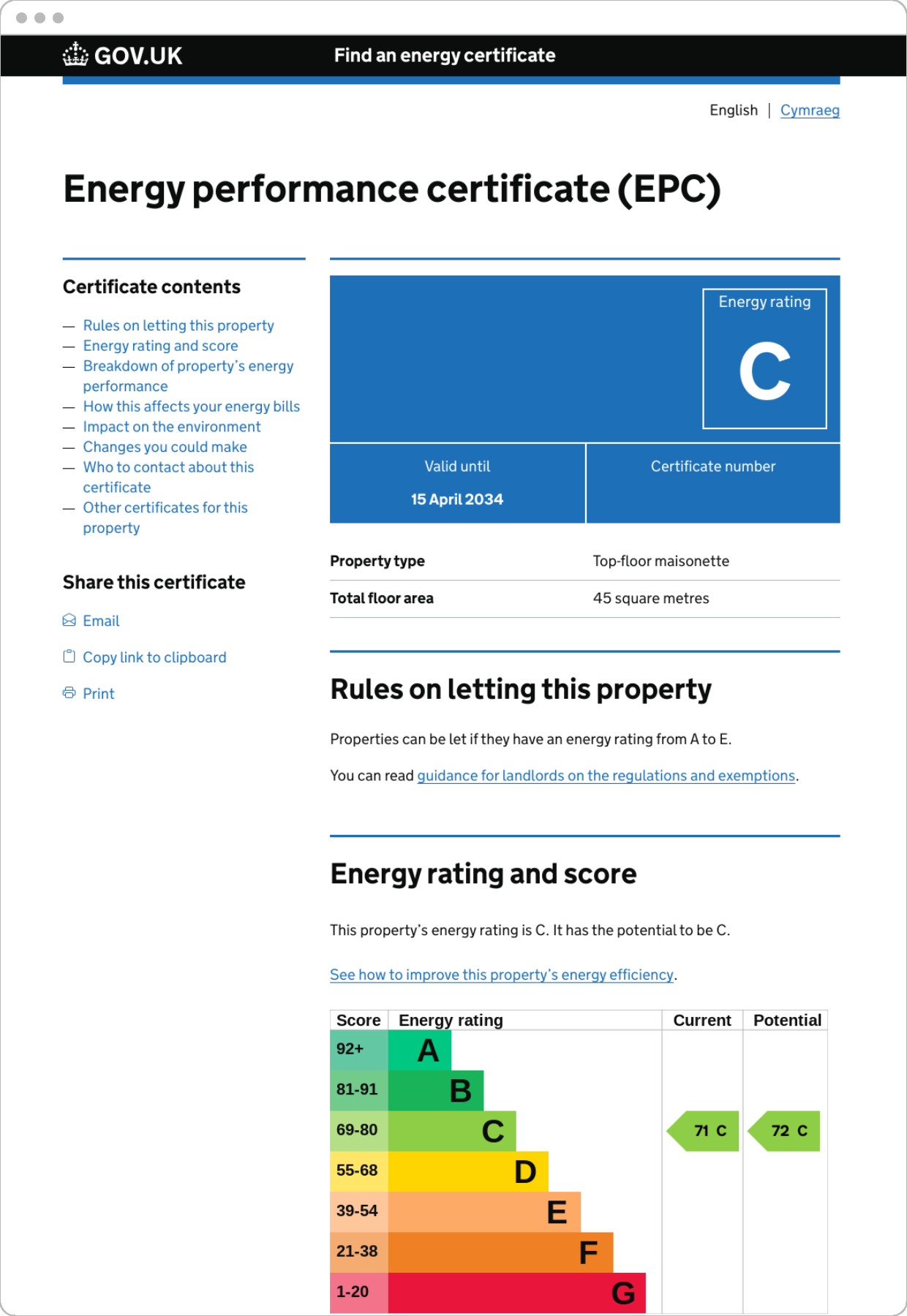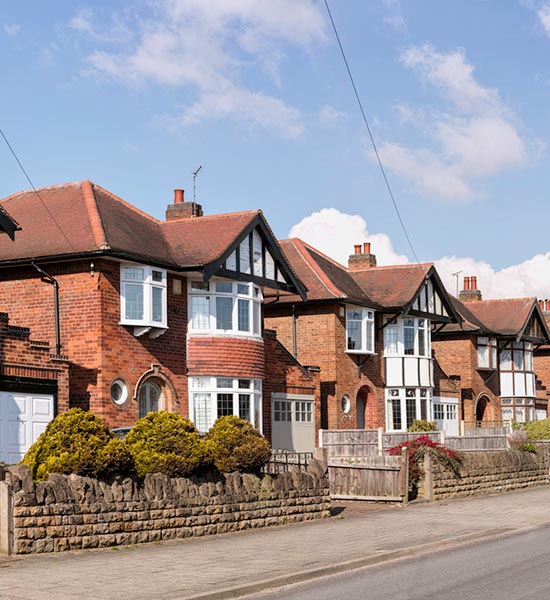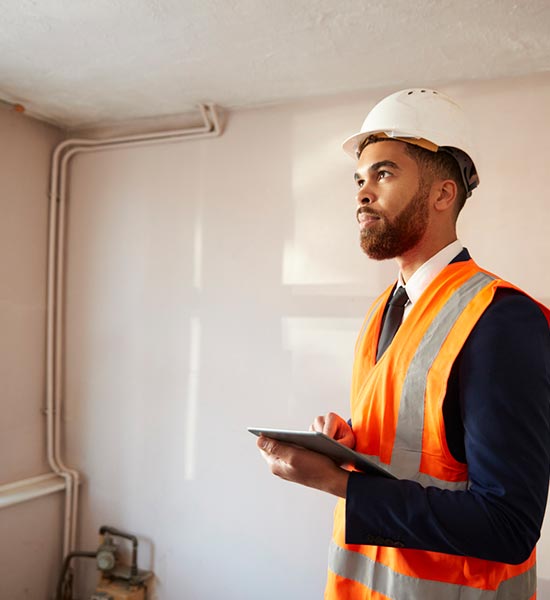



If your building was constructed more than 10 years ago it just needs a standard Domestic EPC. If it was built after this, or is a conversion to a dwelling from a different type of building, such as a barn conversion, and the build or conversion took place within the last 10 years, then you may need a different type of survey called a SAP EPC.
Domestic EPCs are also required for various schemes and funding opportunities, such as the Boiler Upgrade Scheme (BUS), and also for Minimum Energy Efficiency Standard (MEES) exemptions.
Simply request your quote using our contact form or by phone. Our customer care team will quickly get in touch during opening hours.
We will arrange an appointment with you, carry out the survey, and once completed send you an invoice.
As soon as we receive payment of the invoice, we will email your EPC. We also offer corporate accounts, with survey delivery on completion and monthly billing.

Our large team of DEAs can carry out EPC surveys on domestic buildings of any size and complexity, anywhere in the UK and are fully supported by our office based technical team, who are highly knowledgeable on every part of the EPC process.
As soon as your EPC is ready to go we will contact you to make payment, and upon receipt of payment, we will provide access to your documents straight away. As of September 2020, EPCs are no longer provided as PDF documents and are instead a webpage on a government hosted website, so your EPC will be provided as a link. For detailed information about what is contained in the domestic EPC see our guide EPC Explained.

Previously, listed buildings were also exempt for rental, however this became more complicated since the introduction of the Minimum Energy Efficiency Standards (MEES) legislation in 2018. Now any listed properties that are for rental need to either have an EPC with at least an E rating or better, or apply to be put on the MEES exemption register. To go on this register it is required that evidence is provided as to why the improvement recommendations on the EPC are not suitable for the building, and the only way to do this is by getting an EPC. Find out if you’re eligible for MEES exemption.
As such the only domestic dwellings currently exempt from needing an EPC are listed buildings for sale. Even for these buildings, an increasing number of mortgage companies and financial institutions are refusing to carry out sale transactions unless either there is an E rated or better EPC in place, or the building is on the MEES exemption register.


The assessor will need to draw a basic floorplan to determine the floor area of the dwelling and to take measurements of various different wall types in the property. They will also take a series of photographs and notes to enable them to process the report later at their desk.
The survey looks at the following elements:
It is important to note that the survey is non-invasive. The assessor will not be lifting any floorboards or drilling holes in walls. As such they will only be able to record any insulation etc. that is visible to them on the day.
If your property has cavity wall insulation they will be able to identify this from the marks left behind on the brickwork after installation. For any other type of insulation that is not visible, such as under floor insulation or loft insulation where there is no loft hatch, or if the loft is boarded out with the insulation below, then they will be able to accept evidence from you in the form of an invoice from the installer. If the insulation is not visible and no documentary evidence is available then the EPC software will make an assumption about what may be present based on the construction date of the property.
On the day of the survey the assessor will need access to every room in the dwelling. They will also need to see the heating system, and look in the loft if it is accessible. It is helpful if you can have ready any documents you may have relating to any of the items included in the survey, as listed above.
Once we have completed the site visit the survey needs to be processed at the desk, which takes 1 to 2 working days.

Because of this legislation many banks and financial institutions are now also insisting that properties for sale must achieve this rating before they will carry out financial transactions such as mortgages or ownership changes.
If your building gets an F or G on its EPC then we offer a consultation service to help guide you on the best ways to improve the rating. To do this we re-run the calculations multiple times, testing out a combination of different energy saving measures each time to establish the most cost effective and least disruptive ways of improving your buildings rating to an E or better.
Once we have completed the consultation and the work has been carried out, the building will need to be reassessed to produce the updated EPC. As long as this is carried out within 6 months of the date on the original EPC then this revisit can be provided for a reduced fee.


The basic information we need to be able to provide you with a price for the survey is:
It is useful and may enable us to offer a cheaper quote if you are also able to provide the following information:
Once we have provided you with a quote, if you wish to go ahead and book we will also need invoicing details and contact details for whoever will be meeting us on site. We don't charge up-front, but will invoice you for the work on completion, and release the EPC to you upon receipt of payment. Our pricing includes the lodgement of the EPC on the government register, so the price we quote you is the total price you will pay.
After you have booked with us we will contact you or if you prefer an alternative site contact to arrange an appointment. Once we have visited site it takes us 1 to 2 working days to produce the report, at which point we will contact you to let you know it's ready and provide you with an invoice. On payment of the invoice we will provide access to your EPC documents straight away.
Use our online booking tool to quickly get a quote for your RdSAP EPC.
Our prices start from £39.95 + VAT, depending on size and location of the property.


For a domestic EPC, the survey generally lasts around 30 mins for a standard size property.
The assessor will be taking measurements, notes and a series of photographs. They will be looking at the way the building is constructed and insulated, the space and hot water heating systems, ventilation and lighting.
On booking we will email you detailed information about this, however the most important thing is to make sure the assessor can easily access all areas of the building, and to get together any documentation you may have detailing information about the building's construction and insulation, space and hot water heating systems, ventilation and lighting.
Both commercial and domestic EPCs are valid for a period of 10 years from the date of lodgement.
You can search for existing EPCs on the government register at gov.uk/find-energy-certificate. We will check this for you on booking if requested.
Our prices start from £49.95 + VAT, depending on size and location of the property.
Every property certificate, swiftly delivered